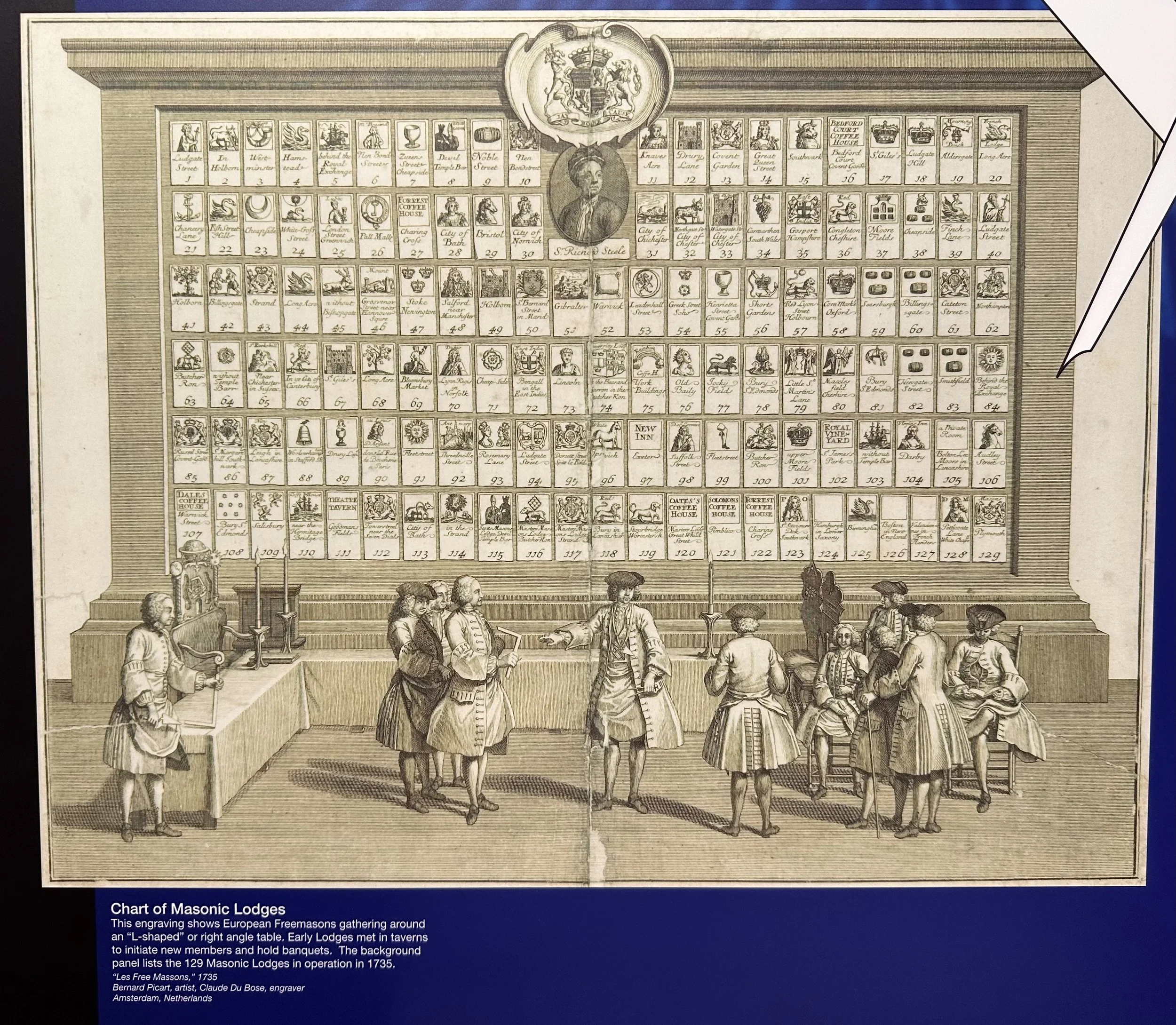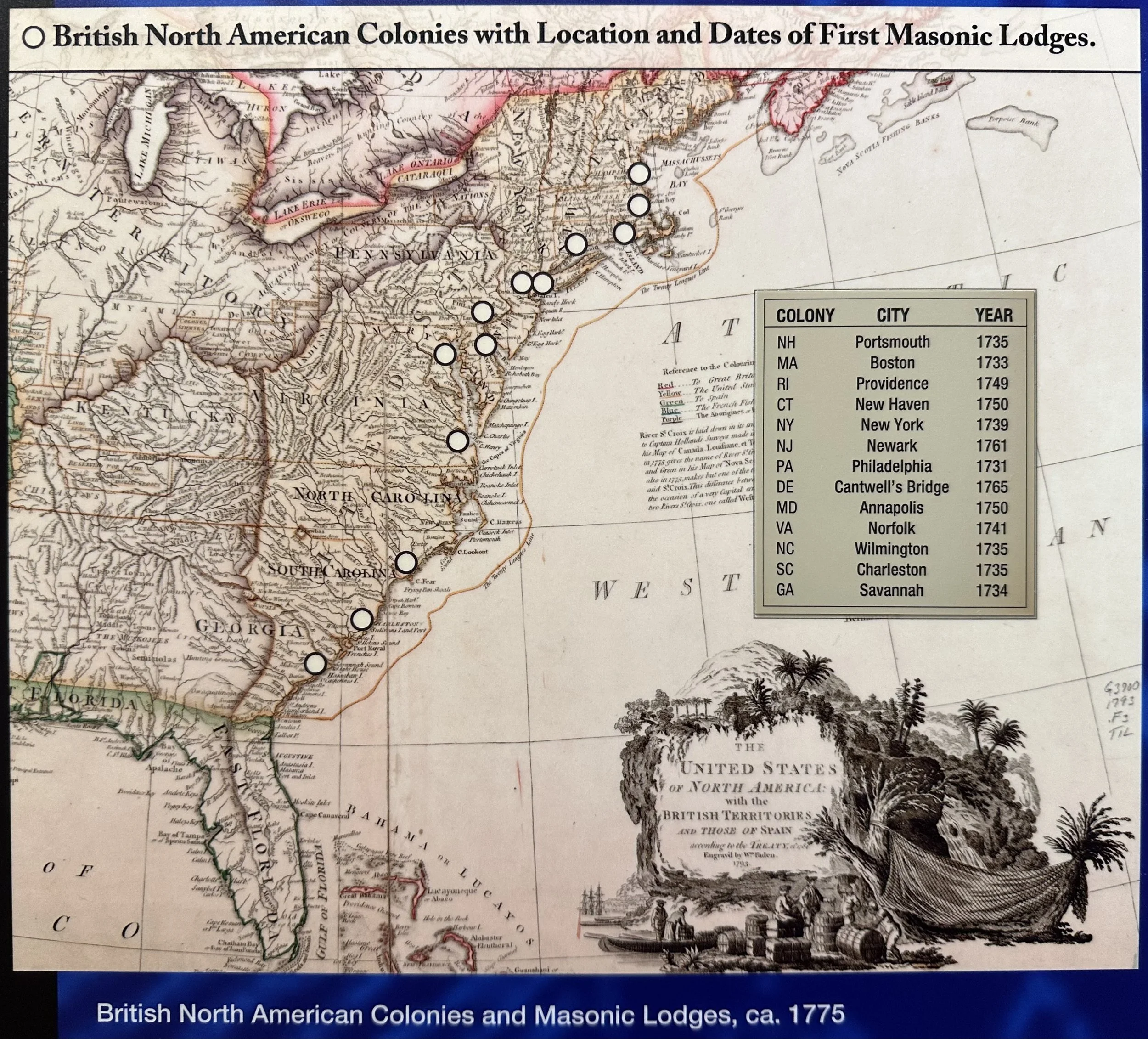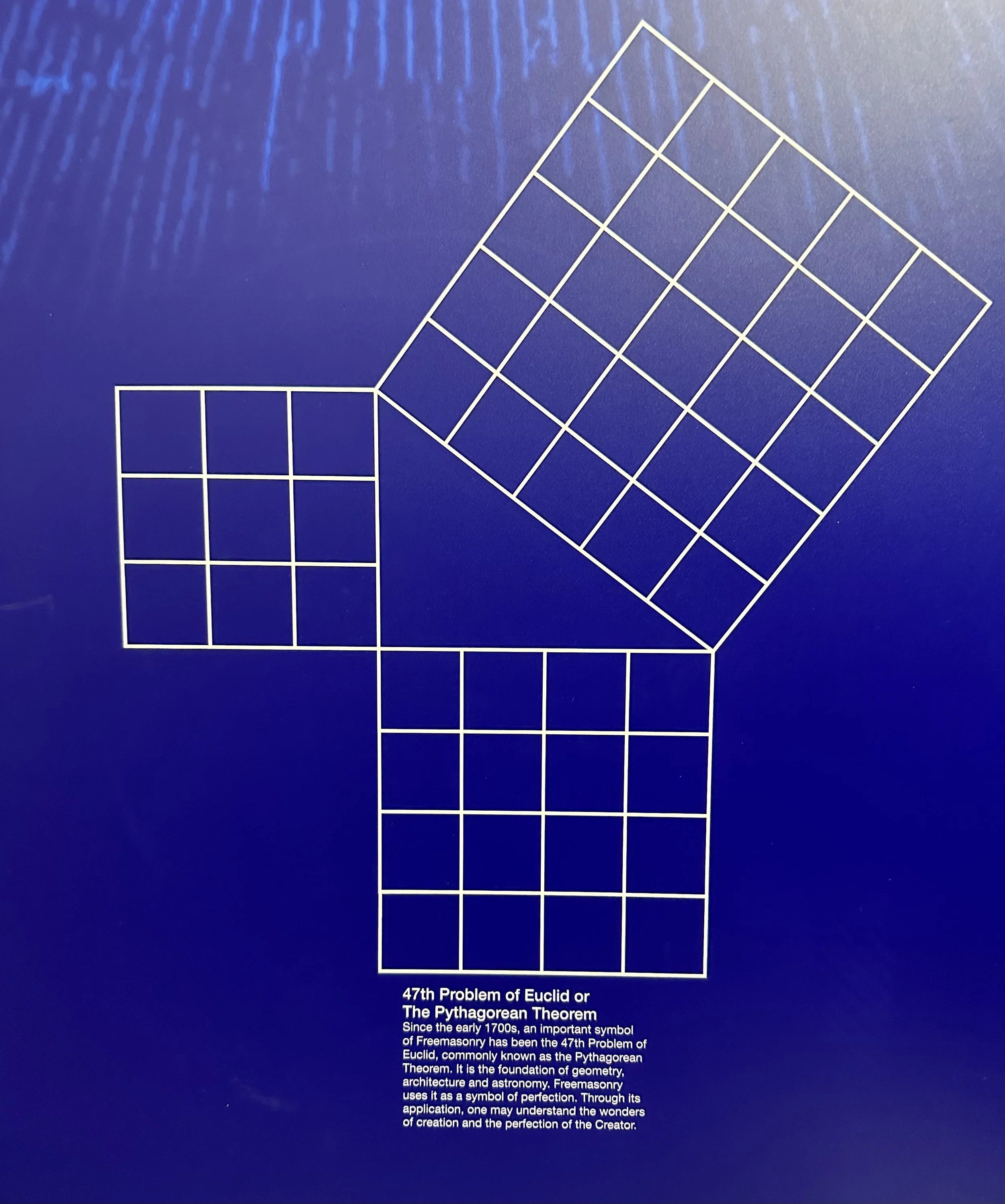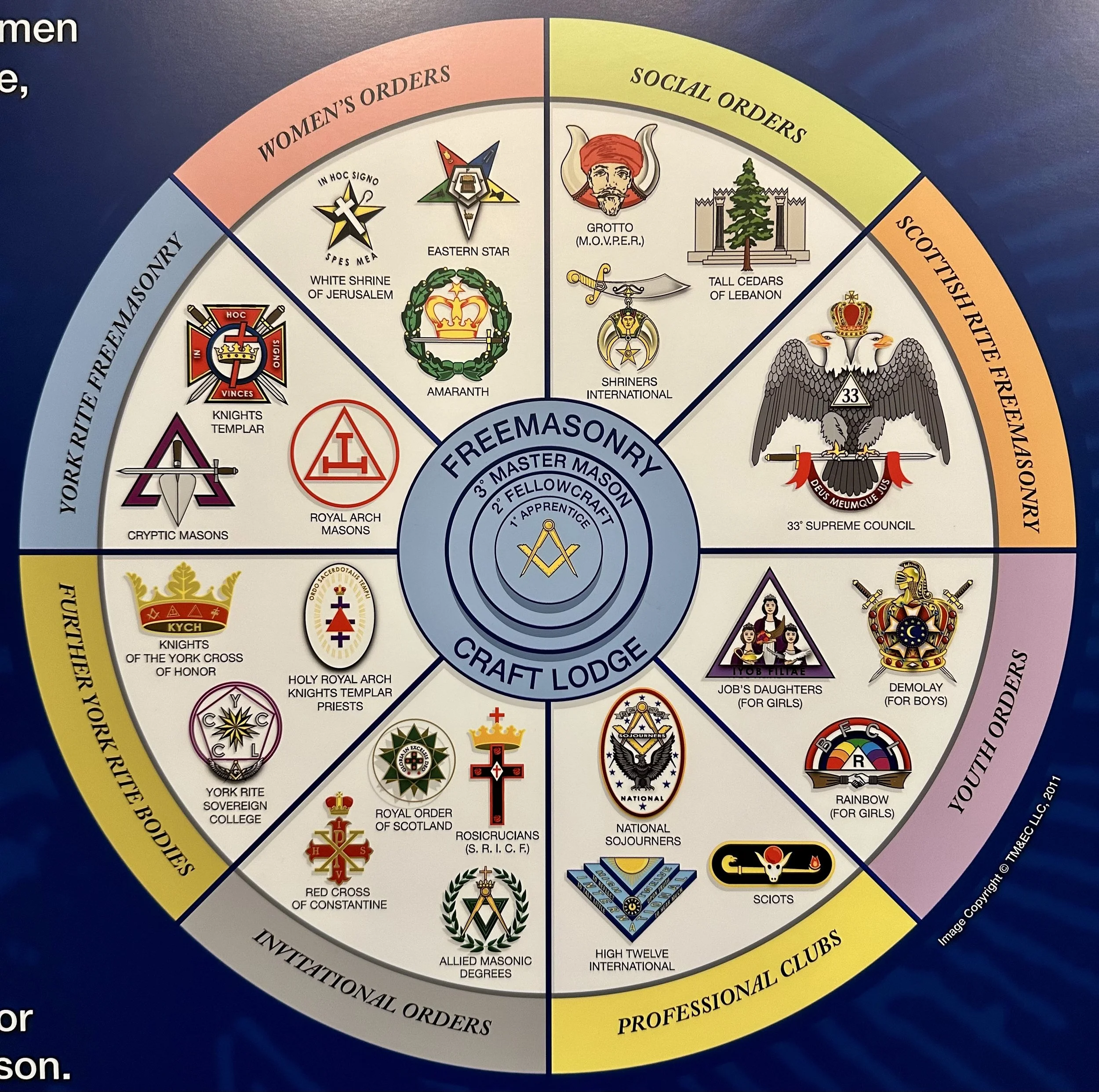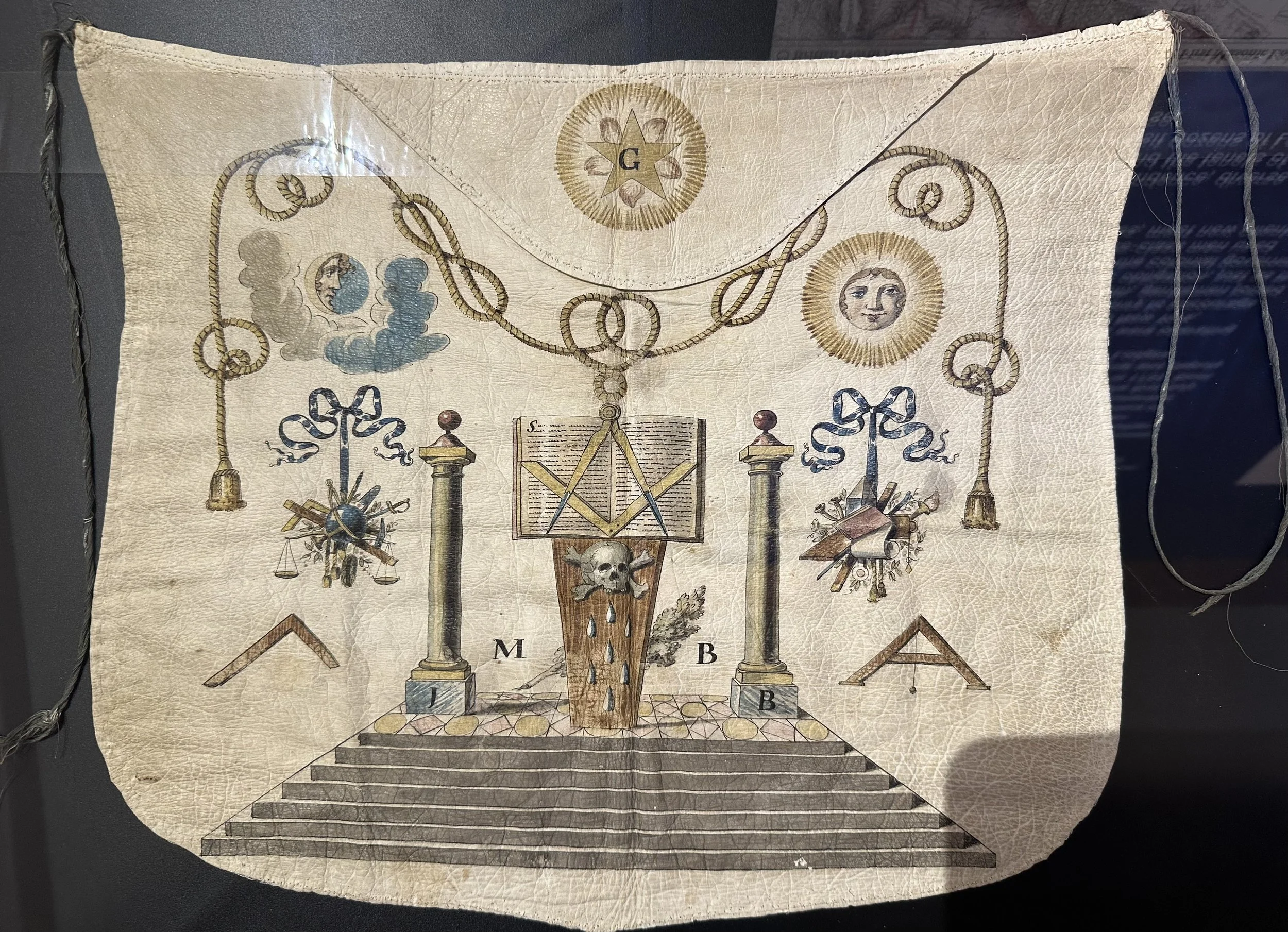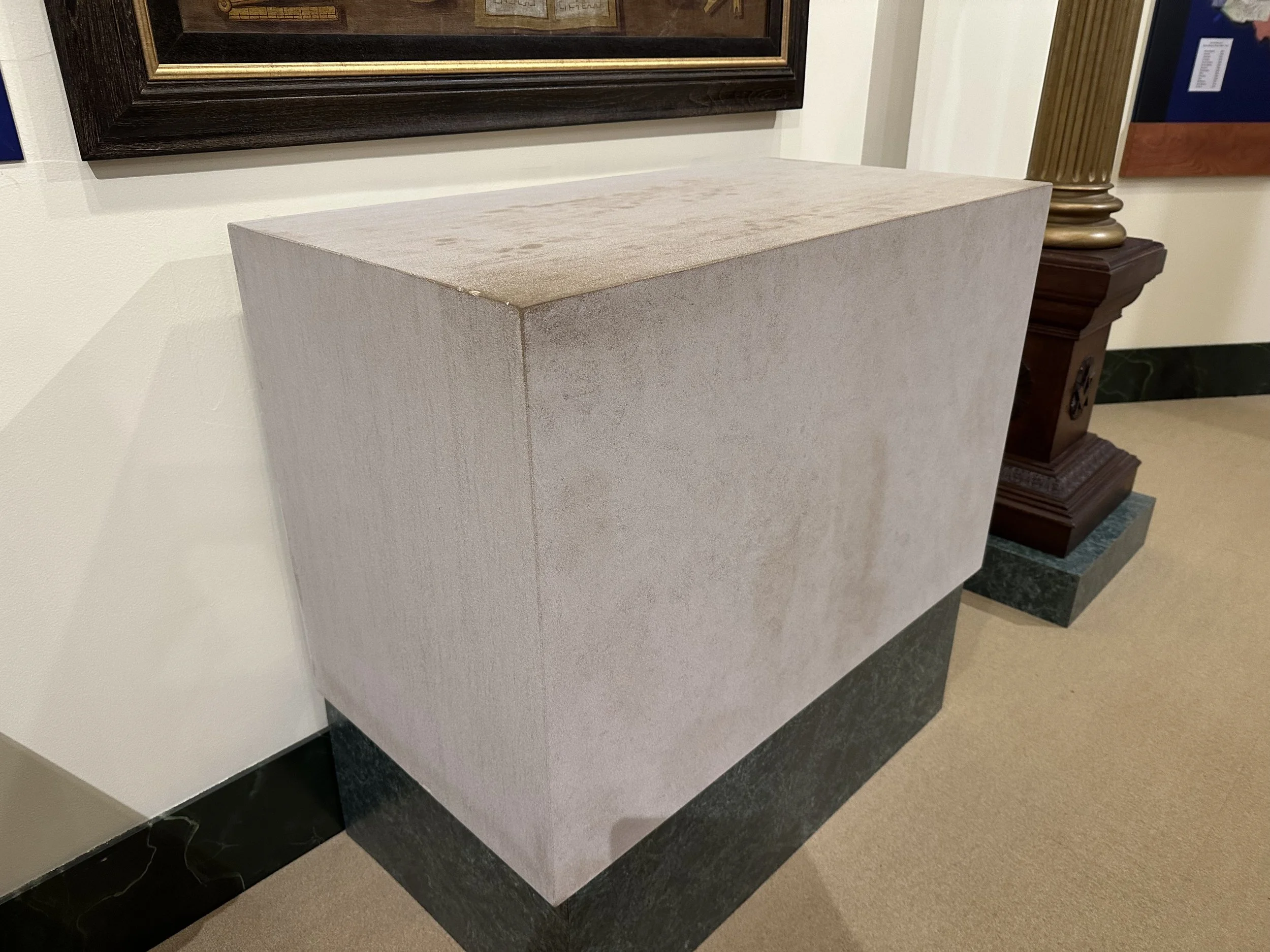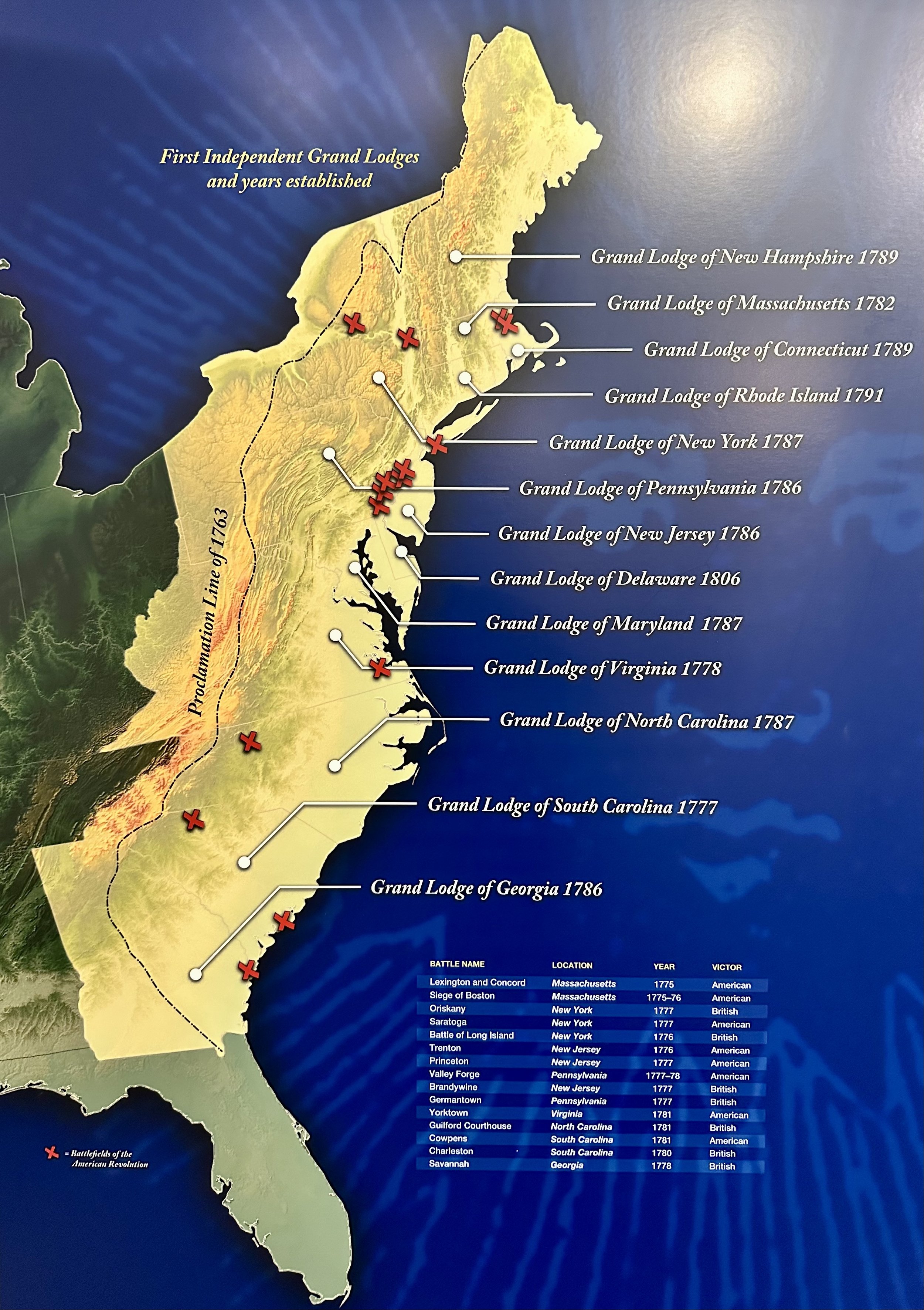The George Washington Masonic National Memorial
Alexandria, VA
_________________________________________________________________________
Summary
History of the Freemasons of the USA as presented in the George Washington Masonic National Memorial in Alexandria, VA, which was founded in 1932 and modeled after the Lighthouse of Alexandria; one of the ancient seven wonders of the world.
Freemasons evolved out of 1600s European medieval stone mason’s guilds (‘guilds of crossmen’). Originally these guilds were groups of masons that met in lodges across Europe to share secret masonry (construction) practices. Freemasonry is founded on the fundamentals of stonemason’s guilds, Judeo-Christian values, and enlightenment era thinking, and their members stand for reason, fraternity, and moral philosophy.
Freemasonry's purpose is to improve men so they may improve society. Freemasonry explains the journey for perfection through the rough ashlar, symbolizing ignorance and barbarism, and the perfect ashlar, symbolizing knowledge and civility.
Early freemasons had three initial degrees. The first degree of the Entered Apprentice, the second degree of Fellowcraft, and the third degree of Master Mason.
________________________________________________________________________
Influential Freemasons
François-Marie Arouet (‘Voltaire’) (1694-1778): French enlightenment writer, philosopher, satirist, and historian.
Benjamin Franklin (1706-1790): American polymath; a writer, scientist, inventor, statesmen, diplomat, printer, publisher, and political philosopher.
1727: Establishes the Junto, a society of young men who meet for “self-improvement, study, mutual aid, and conviviality.”
1731: Joins his local Masonic lodge and forms the library company, the first lending library in the America’s.
1736: Appointed clerk of the PA Assembly; organizes the Union Fire Company, the first in the Colonies.
1737: Appointed Postmaster of Philadelphia
1739: Protests against pollution from "Slaughter-Houses, Tan-Yards, Skinner Lime-Pits, etc."
1744: Founds the American Philosophical Society.
1748: Becomes a soldier in the militia after turning down a commission as a colonel.
1749: Appointed Provincial Grand Master of Freemasons.
1749: Appointed first president of the Academy and College of Philadelphia (later the University of PA).
1751: Assists in chartering the Pennsylvania Hospital, the first in the Colonies.
1752: Helps found the Philadelphia Contributionship for Insuring of Houses from Loss Against Fire.
1775: Elected as a PA delegate to 2nd Continental Congress; serves as chairman of PA Committee of Safety; Elected Postmaster General of the Colonies.
1789: Becomes president of the Society for Promoting the Abolition of Slavery.
George Washington (1732-1799): 1st POTUS.
Wolfgang Amadeus Mozart (1756-1791): Prolific and influential composer of the Classical period.
Robert Burns (‘Rabbie’) (1759-1796): Scottish Poet and lyricist. Widely regarded as the national poet of Scotland.
Andrew Jackson (‘Old Hickory’) (1767-1845): A champion of the Western states and the common man. Born in NC, he migrated to TN as a young man. Known for his strength, intelligence and fierce temper, he rose quickly in TN politics and society. Through Jackson's frontier successes and network of military, political and Masonic support, Jackson was elected POTUS in 1828 and again in 1832. As POOTUS, he built the nation into a greater union. He fought against the vested interests of the Second Bank of the US, signed treaties and tariffs to protect American farmers and industry, and insisted Indian tribes assimilate or move further west. When he left office, the USG was free of debt and running a surplus budget. Today he is a symbol of the democratic principle of popular election and the application of the Jeffersonian ideal of a self-reliant, educated and free people.
1796: US Congressman from TN.
1797: US Senator from TN.
1798: TN Supreme Court Judge.
1804: MGEN, TN Militia.
1815: MGEN, USA; defeats British at Battle of New Orleans.
1821: First Territorial Governor of FL.
1822: Grandmaster of Grand Lodge of TN.
1823: US Senator from TN.
1828: Elected POTUS.
1832: Re-elected POTUS.
James A. Garfield (1831-1881): 20th POTUS.
Sir Arthur Conan Doyle (1859-1930): British writer and physician; created the character Sherlock Holmes in 1887.
Henry Ford (1863-1947): American industrialist and business magnate; founded the Ford Motor company.
Warren G. Harding (1865-1923): 29th POTUS.
Douglas MacArthur (1880-1964): American General who served as a soldier in WWI and a top commander during WWII and the Korean War.
Franklin Delano Roosevelt (FDR) (1882-1945): 32nd POTUS.
Harry Truman (1884-1972): 33rd POTUS; Freemasonry was fundamental to Harry Truman. He joined when he was 25 and remained active his whole life. He served as Grand Master of the Grand Lodge of MO in 1940-41 while serving as Senator for MO. Throughout his life he joined and participated in nearly every Masonic organization and even in retirement he continued to attend Masonic functions and support the Fraternity. Truman's life is a witness to the radical changes of the 20c. He grew up in a small town in the days of the horse and buggy. As he matured, so did the nation. Searching for work off the farm, he joined the local Masonic Lodge. He started a clothing shop in the 1920s and found a network of friends and customers within the growing Masonic organizations of Kansas City and Independence, MO. As he made his way into politics, he used the knowledge, skills and education of Freemasonry to make friends, talk to audiences and listen to others. To Truman and the Masons of the early 20c, Freemasonry was instrumental in understanding the changing world. Through his own education and improvement, Truman reluctantly became POTUS upon the death of FDR. He accepted the job, emerged victorious after the hard-fought election of 1948, and during the 7 yrs of his presidency, he improved the nation and the communities of other nations around the world. As POTUS, he helped form the UN, desegregated the US Armed Forces, supported the founding of Israel, initiated the Marshall Plan for Europe and defended Greece, Turkey and Korea against hostile Communism. After leaving the presidency, Truman remained an active Mason for many years and on several occasions remarked, "The greatest honor that has ever come to me, and that can ever come to me in my life, is to be Grand Master of Masons in Missouri.”
Apr, 1945: Death of FDR; Truman becomes POTUS.
May, 1945: Surrender of Nazi Germany; VE Day.
Jun, 1945: Signing of UN Charter.
Aug, 1945: Surrender of Japan; end of WWII.
1946: Establishes the Atomic Energy Commission (AEC).
1947: Creates DoD; establishes the US Air Force, the CIA, and NSC.
1948: Creates European Recovery Program (Marshall Plan) to help rebuild Europe’s economy.
1948: Declares Truman Doctrine to contain the spread of Communism
1948: Creates Displaced Persons Act authorizing admission of WWII refugees.
1948: Organizes Berlin Airlift of food and supplies against Soviet siege.
1948: De-segregates Armed forces and USG.
1949: Organizes NATO for the military security of Europe.
1949: Organizes the new state of Israel.
1950: Defends S. Korea from N. Korea and Chinese aggression.
1951: Creates India Emergency Food Aid, lending $190M to India to buy grain.
1952: Reorganizes the IRS.
John Edgar Hoover (1895-1972): American law enforcement administrator who served as the 5th and final director of the Bureau of Investigation and the first director of the FBI.
Buzz Aldrin (1930-): American astronaut, aeronautical engineer, and fighter pilot. The second person to walk on the moon after mission commander Neil Armstrong.
_________________________________________________________________________
Misc Quotes
Between 1900 and 1950, American idealism came face to face with modern realities. Older generations built the country through hard work, morality and free enterprise. But new generations would remodel the nation through technology, regulation and personality. The American dream turned from "what you knew and what you did," to "who you knew and what you had." Dramatic shifts occurred in the American economy, family and society as a whole. The economy moved from heavy industry to consumer manufacturing as the middle-class filled their suburban homes with all the modern conveniences. The family changed as more people lived in cities than on the farm, women worked in greater numbers and children attended college. Big business, big government and big labor unions so dominated society, that most Americans became convinced any problem could be solved with the right regulations and resources. But the new age also brought great challenges and sacrifices. The early optimism was killed in the slaughter of World War I. The Great Depression of the 1930s destroyed countless lives and uprooted families as they searched for work. World War Il demanded greater sacrifices to achieve victory in Europe and Japan in 1945 and restore economic prosperity at home by 1950.
_________________________________________________________________________
Chronology
1600s: Freemasonry originates out of British Trade Guilds to “improve men by teaching virtue and moral truths” (GW Masonic National Memorial).
1717: Four London masonry lodges (‘guilds’) organize a grand lodge in London- the “Most Ancient and Right Worshipful Fraternity of Accepted Free Masons” (‘the London Grand Lodge’) to govern themselves (GW Masonic National Memorial).
1727: Benjamin Franklin establishes the Junto, a society of young men who meet for “self-improvement, study, mutual aid, and conviviality” (GW Masonic National Memorial).
1731: America’s first freemason lodge opens in Philadelphia (GW Masonic National Memorial).
1731: Benjamin Franklin forms the library company, the first lending library in the America’s (GW Masonic National Memorial).
1733: America’s second freemason lodge opens in Boston (GW Masonic National Memorial).
1736: Benjamin Franklin organizes the Union Fire Company, the first in the Colonies (GW Masonic National Memorial).
1744: Benjamin Franklin founds the American Philosophical Society (GW Masonic National Memorial).
1826: Freemason William Morgan promises to share freemasons secrets. He is kidnapped and never seen again, leading to the establishment of the anti-Masonic political party (GW Masonic National Memorial).
1826-1842: Anti-Masonic hysteria period; freemasons are persecuted, banished from churches, and shunned by neighbors (GW Masonic National Memorial).
1948: POTUS Truman enacts the Displaced Persons Act, authorizing admission of WWII refugees to the USA (GW Masonic National Memorial).
1951: POTUS Truman enacts the India Emergency Food Aid, lending $190M to India to buy grain (GW Masonic National Memorial).
_________________________________________________________________________

